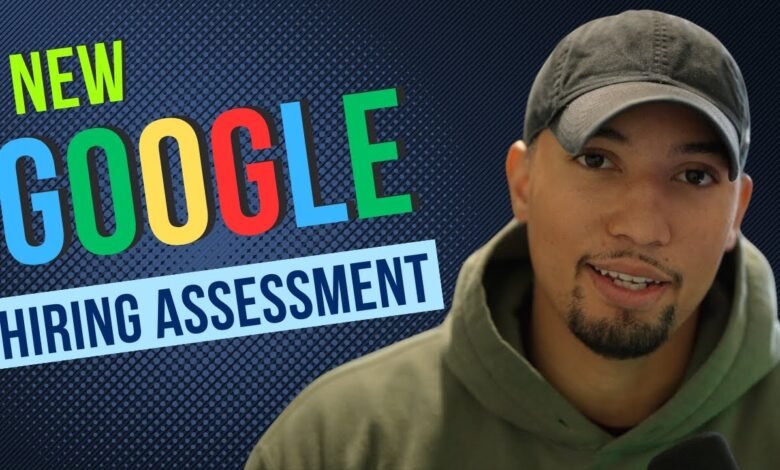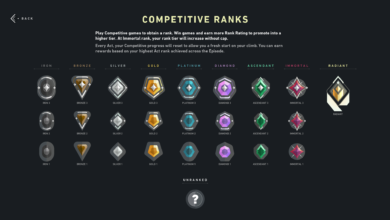Understanding the Google Hiring Assessment: A Comprehensive Guide

What is the Google Hiring Assessment?
The Google Hiring Assessment is a structured evaluation framework that serves a critical role in Google’s recruitment process. Designed to identify qualified candidates, this assessment aims to gauge not only the technical skills relevant to specific job roles but also the candidates’ alignment with Google’s distinctive work culture and values. By utilizing a variety of assessment formats, Google ensures a comprehensive analysis of each candidate’s potential suitability for the organization.
This multi-faceted approach encompasses several types of evaluations tailored to different positions within the company. These assessments can range from coding challenges for engineering roles to case studies for positions in product management or marketing. The Google hiring assessment process is carefully crafted to test candidates on a multitude of dimensions, including problem-solving abilities, analytical thinking, and cultural fit. It effectively combines both practical tasks and theoretical knowledge, allowing for a well-rounded evaluation.
Why is the Google Hiring Assessment Important?
The Google Hiring Assessment plays a crucial role in the recruitment process for the tech giant, serving as a key mechanism for both the organization and the candidates involved. For Google, the assessment is instrumental in identifying top-tier talent that aligns with their core values and needs. By implementing a structured evaluation process, the company effectively filters candidates based on their problem-solving abilities, technical knowledge, and cultural fit, which are critical for driving innovation and maintaining a competitive edge in the technology sector.
The rigorous nature of the Google Hiring Assessment helps ensure that only those who demonstrate exceptional aptitude and capability progress through the hiring pipeline. As a result, Google can efficiently assemble a skilled workforce that supports its mission and objectives. This targeted approach not only enhances the quality of new hires but also mitigates the risk of high turnover rates, thereby optimizing resource allocation within the organization.
On the other hand, candidates also stand to gain significantly from their understanding of the Google Hiring Assessment. By familiarizing themselves with the format and expectations of the assessment, candidates can better prepare and align their skills with the competencies that Google seeks. This preparation may include honing technical skills, practicing problem-solving techniques, and refining behavioral interview responses. The insights gained from engaging with the assessment process can empower candidates to present their strengths more effectively, ultimately enhancing their chances of success.
Furthermore, by participating in the Google Hiring Assessment, candidates gain valuable feedback on their performance, which can serve as a guide for their future career endeavors. This dual benefit underscores the importance of the assessment, not only as a filtering tool for recruitment but also as a developmental opportunity for aspirants striving to join one of the world’s leading companies.
Types of Google Hiring Assessments
Google’s hiring assessments are meticulously designed to evaluate a candidate’s aptitude, skills, and overall fit within the company culture. These assessments can broadly be classified into four categories: technical evaluations, coding interviews, behavioral interviews, and situational judgment tests. Each type serves a distinct purpose and provides insights into the specific abilities and traits that Google prioritizes in potential employees.
Technical evaluations are primarily aimed at assessing a candidate’s proficiency in their specific field. These assessments may include comprehensive questions related to algorithms, system design, or domain-specific knowledge. A software engineering candidate, for example, might be tested on their understanding of data structures and the efficiency of different algorithms. The goal is to ensure that the candidate possesses the foundational knowledge necessary for success in their role.
Coding interviews, on the other hand, focus on a candidate’s problem-solving abilities and coding skills. During these assessments, candidates are typically given real-time coding challenges that require them to demonstrate their ability to write clean, efficient code under time constraints. Applicants might be asked to solve a problem on a collaborative platform, allowing the interviewers to assess not only the final solution but also the candidate’s thought process and articulations throughout the problem-solving journey.
Behavioral interviews assess personality traits and cultural fit by exploring a candidate’s past experiences. They often involve questions that prompt candidates to discuss how they’ve handled specific situations in previous roles. By understanding how an applicant has navigated challenges, Google can gauge their interpersonal skills, adaptability, and teamwork capabilities.
Finally, situational judgment tests present candidates with hypothetical work-related scenarios to assess their decision-making and prioritization skills. These assessments are crucial in evaluating how well candidates might respond to challenges they could face on the job. Understanding these various types of Google hiring assessments will help candidates prepare more effectively for the selection process.
Preparing for the Google Hiring Assessment
To succeed in the Google Hiring Assessment, candidates must engage in a systematic and thorough preparation process. A strong foundation in relevant technical skills is paramount, as Google seeks individuals who not only excel in their areas of expertise but also demonstrate adaptability and problem-solving capabilities. This involves studying subjects that align closely with the role, such as algorithms, data structures, system design, and programming languages commonly used at Google.
One effective preparation method is to practice coding problems extensively. Platforms such as LeetCode, HackerRank, and CodeSignal offer a plethora of coding challenges that mimic the type of questions candidates may encounter during the assessment. Regular practice can help improve both speed and accuracy, essential factors that evaluators consider during the actual assessment. It’s also beneficial to analyze common question patterns and familiarize oneself with various problem-solving techniques.
In addition to technical proficiency, candidates should prioritize brushing up on behavioral interview techniques. Google emphasizes its company culture and the importance of fit within its diverse workplace environment. Understanding the STAR (Situation, Task, Action, Result) method can provide a solid framework for articulating personal experiences effectively. Candidates are encouraged to reflect on past achievements and challenges that highlight their teamwork, leadership, and conflict resolution skills.
Utilizing online resources and mock assessments can also play a vital role in effective preparation. Engaging in study groups allows candidates to exchange knowledge, troubleshoot problems collaboratively, and motivate one another. Mock interviews can simulate the real assessment setting, helping candidates get accustomed to the interview process while receiving constructive feedback.
Overall, a well-rounded approach that emphasizes both technical skills and behavioral understanding will significantly enhance a candidate’s readiness for the Google Hiring Assessment.
Common Mistakes to Avoid in the Google Hiring Assessment
When preparing for the Google hiring assessment, candidates must be aware of the common mistakes that can hinder their success. One of the most prevalent pitfalls is inadequate preparation. Many candidates underestimate the challenge of the assessment, believing that their qualifications and experience will suffice. However, it is essential to engage in thorough preparation that includes understanding the types of questions that may be asked and practicing problem-solving skills relevant to the role. This means going beyond general knowledge and delving into technical concepts, algorithms, and coding challenges that are often part of the evaluation process.
Another common mistake candidates make is misunderstanding the questions posed during the assessment. Misinterpretation can lead to irrelevant responses or inadequate solutions. Candidates should take the time to read each question carefully, ensuring they comprehend what is being asked. If there is any confusion, it is advisable to ask for clarification instead of making assumptions that could lead to incorrect answers. Moreover, practicing under timed conditions can assist candidates in becoming more comfortable with the pacing of the assessment.
Additionally, failing to communicate effectively during interviews is a significant error that candidates should avoid. During technical interviews, candidates often focus solely on solving problems but neglect to verbalize their thought process. Clear communication allows interviewers to understand the candidate’s reasoning and problem-solving approach, which is just as important as arriving at a correct solution. Candidates should practice articulating their ideas and demonstrating their methodology step-by-step.
Being aware of these common mistakes is crucial in successfully navigating the Google hiring assessment. Through diligent preparation, careful reading of questions, and effective communication, candidates can enhance their performance and increase their chances of securing a position at Google.
Real Candidate Experiences with the Google Hiring Assessment
The journey through the Google hiring assessment can be both exhilarating and daunting, as shared by a range of candidates who have navigated this process. One candidate, Alex, disclosed that the initial online coding test was the most intimidating aspect. “I prepared for weeks, but the pressure during the test was intense,” he recalled. Alex emphasized the importance of practicing data structures and algorithms, which he believes are critical to performing well in the coding assessments. He suggested utilizing platforms like LeetCode and HackerRank to simulate real test conditions.
Another candidate, Rachel, recounted her experience during the behavioral interview portion. She noted that while technical prowess is crucial, Google also places significant emphasis on cultural fit. “I focused on the company’s values,” she explained, “ensuring I aligned my responses to demonstrate adaptability and teamwork.” This insight reinforces the idea that understanding Google’s culture can help candidates articulate their experiences more effectively during the interview.
Some candidates, like Thomas, highlighted the importance of feedback. “I didn’t get through the first time,” he mentioned. “But I sought feedback and tailored my preparation for the next attempt.” His persistence paid off; he successfully passed the google hiring assessment on his second try. Through Thomas’ experience, it becomes clear that resilience and a willingness to learn from setbacks significantly enhance the chances of success.
In addition to practical tips, several candidates recommended joining study groups or forums. Engaging with others undergoing the same journey not only provides motivation but also diversifies understanding of potential interview questions. Sharing experiences contributes to a well-rounded preparation strategy, crucial for tackling the multifaceted nature of the Google hiring assessment.
What to Expect on Assessment Day
Preparing for the Google hiring assessment involves knowing what to expect on the actual day of evaluation. Candidates should arrive at the assessment venue with a clear understanding of the interview environment, the format of the assessment, and the types of questions or tasks they are likely to encounter. Google typically ensures a collaborative and supportive atmosphere, allowing candidates to feel comfortable while showcasing their skills.
The assessment itself may vary in format, including a combination of coding challenges, technical questions, and behavioral interviews. It is essential for candidates to be adaptable, as the specific approach can differ based on the position being applied for. For instance, software engineering candidates may engage in algorithmic challenges, while product management applicants could face scenario-based questions testing their decision-making abilities.
On the day of the assessment, the timeline is generally structured; candidates can expect a schedule that includes multiple rounds of interviews, typically lasting from one to four hours in total. It is beneficial for individuals to familiarize themselves with common questions or tasks relevant to their field, as this preparation allows for more coherent and confident responses during the evaluations.
Logistically, candidates should ensure that they arrive early to avoid any unnecessary stress. It’s crucial to bring necessary documentation, such as identification and any required materials, as specified in pre-assessment communications. Mindset preparation is equally important; candidates should aim to maintain a calm and positive attitude, focusing on effectively demonstrating their expertise and problem-solving capabilities throughout the assessment process. Overall, understanding these components can significantly enhance a candidate’s performance during the Google hiring assessment.
How is the Google Hiring Assessment Scored?
The Google Hiring Assessment employs a structured scoring system to evaluate candidates effectively. This assessment focuses on several key areas including technical abilities, cultural fit, and problem-solving skills. Each of these areas carries significant weight in the final scoring, as they collectively contribute to determining a candidate’s suitability for various roles within the organization.
Initially, candidates undergo a variety of assessments designed to evaluate their technical skills relevant to the job they are applying for. Each candidate’s responses are assessed against standardized metrics which measure not only correctness but also the efficiency of their problem-solving methods. The evaluators look for logical reasoning, creativity, and clarity of thought, which are vital in a dynamic work environment like Google’s.
Cultural fit is assessed through behavioral interviews and situational judgment tests, where candidates are asked to exhibit scenarios that elucidate their personal values and work ethic. The evaluators aim to gauge alignment with Google’s principles and collaborative spirit. This aspect is fundamental because Google values candidates who can contribute positively to the company culture.
Moreover, the final scores are not solely based on the numerical results from coding or problem-solving tasks. Assessors take a comprehensive view, integrating scores from various stages of the assessment process. Candidates receive feedback that captures their strengths and areas for improvement, enabling them to understand the components that influence their overall evaluation in the Google hiring assessment. This multifaceted approach ensures that candidates are measured not just on their technical prowess but also on how they fit into the broader organizational framework.
Next Steps After the Google Hiring Assessment
Completing the Google hiring assessment is a significant milestone in the recruitment process, but it is essential for candidates to understand what comes next. After submission of the assessment, candidates can typically expect to wait a few weeks for feedback from the recruitment team. This timeline may vary depending on the volume of applications, the role being applied for, and the specific hiring practices of Google. During this wait, maintaining patience and focus on other opportunities is advisable.
Once feedback is received, candidates may either be invited for follow-up interviews or informed that they have not progressed in the hiring process. Successful candidates will often find that these follow-up interviews gauge not only their technical skills but also assess cultural fit within the company. Candidates should prepare for the interviews by revisiting the concepts and skills evaluated in the initial Google hiring assessment, as they may be further explored during these discussions.
In the event of a job offer, candidates should take the time to thoroughly evaluate it, including salary, benefits, and the role’s overall alignment with their career goals. It is also wise to have an open discussion with the recruiting team about any questions or concerns regarding the offer. Conversely, if the outcome is a rejection, candidates can inquire about the reasons behind the decision. This feedback can provide valuable insights into areas for improvement in future applications or assessments.
Ultimately, maintaining transparent communication with the recruitment team is crucial, regardless of the outcome. It shows professionalism and can leave the door open for future opportunities at Google. Understanding the post-assessment process can help candidates set realistic expectations and navigate their next steps with confidence.
You May Also Read This Usadigitalhub.



